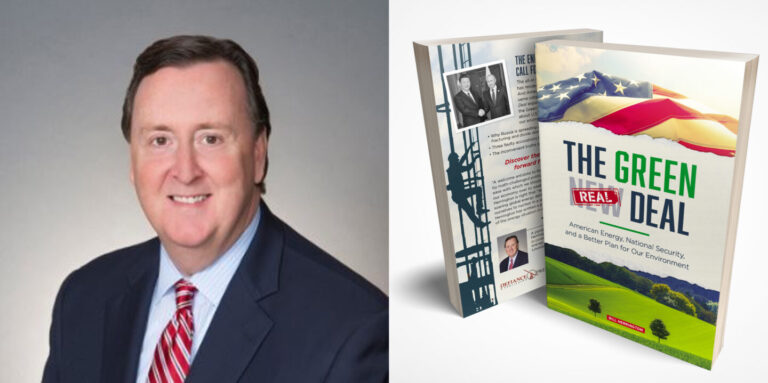
The Green Real Deal was the winner in the Politics/Current Events category of the 2024 IndieReader Discovery Awards, where undiscovered talent meets people with the power to make a difference.
Following find an interview with author Bill Herrington.
What is the name of the book and when was it published?
The Green Real Deal, by Bill Herrington, was released on July 14, 2023.
What’s the book’s first line?
If anything positive can come from the 2022 war between Russia and Ukraine, it may be the opportunity for a course correction and critical change in the energy policy of the West.
What’s the book about? Give us the “pitch”.
The Green Real Deal reveals the truth about U.S. energy, national security, and the environment – and the danger of plans like the Green New Deal. It opens with the Russian invasion of Ukraine, a timely wake-up call that the all-in stance in favor of renewables has rendered Europe
vulnerable. And America is in danger of making the same catastrophic mistake. Based on historical accounts, newspaper articles, government documents, investigations, images, and my personal experiences, The Green Real Deal tells the critical role of oil and gas pipelines in WWII,
objectively examines energy options today, and proposes a 5-point energy plan moving forward.
What inspired you to write the book? A particular person? An event?
I was heading to my downtown Houston office in 2016 when I came upon a disturbing demonstration against the Dakota Access Pipeline. It was personal for me. Forty years earlier, I was introduced on a summer pipeline job to an American-made industry and the hardy men who built it. I saw the pipeline construction business from the inside out, and it left an indelible respect for the work ethic of pipeliners and for the necessity of the industry.
From that humble start, I graduated from Louisiana State University and began a 35-year career in corporate banking and private equity, which included a focus on the energy service industry in south Louisiana and Texas. But I never forgot my work as a common laborer on a pipeline forty years earlier. I appreciated the pipeline industry as a solid backbone of the United States, ensuring the necessary energy for our modern way of life, providing national security, supporting our strong economy, and providing stable careers for countless Americans and their families.
So, I was confused by the depiction of the industry as evil. The protestors said pipelines were harmful to the environment, were bad for Americans, and should be eliminated from the United States.
The protest led me to objectively reexamine my understanding of the industry and America. The Green Real Deal is based on personal experiences, national historical accounts, research, and investigations.
What’s the most distinctive thing about the main character? Who – real or fictional – would you say the character reminds you of?
There are two primary players in The Green Real Deal. One is obvious and the other is hidden, but both are threats to national security. The obvious threat is the Green New Deal. It’s a naive, unrealistic, and dangerous plan for our economic and national security. Our nation relied on U.S. oil to win WWII, and oil will continue to be necessary for the foreseeable future. Renewables alone have proven to be intermittent and insufficient in meeting our needs – we must lean on all the resources available to sustain our country, including fossil fuels, renewables, and nuclear energy.
The hidden threat is Russia. Its misinformation campaign was revealed in a 2018 House report. Putin had used propaganda and “useful idiots” to indirectly shape public opinion on American energy and environmental policy. The Green Real Deal examines the propaganda unleashed by
the Kremlin against the oil and gas and pipeline industry and the Congressional report detailing extensive attempts to disseminate deceptive news on energy policy.
What’s the main reason someone should really read this book?
Readers need to understand the linkage between American energy independence and U.S. national and economic security. The call to keep fossil fuels in the ground is unrealistic, endangers our nation, and undermines our economy. We can develop a greener, common-sense approach that is based on practicality, not ideology, which means admitting our need for a more diverse solution than 100-percent renewables – a balanced path forward based on the following five tenets:
1. Accept that fossil fuels and the pipelines that transport them are critical to our national and economic security.
2. Protect our forests from irresponsible destruction.
3. Sensibly expand renewables and rare earth mineral supply chain.
4. Make coal cleaner and discourage new coal plants where feasible.
5. Commit to increased nuclear research and development.
I hope readers will address our energy challenges by partnering with people we haven’t partnered with before, collaborating with industry to improve greenhouse gas emissions and protect the environment, unleashing visionaries, cultivating bold business ideas, and developing technological innovations. And I hope readers can remember where we came from. In a history threatened by the Nazis and totalitarian regimes, our nation was strengthened by the unification of government and private industry. We were victorious in WWII because of pipelines that delivered oil in time for the greatest generation of Americans to defeat Hitler. And we can rely on our natural resources to withstand oppressive countries today, too. Together, we can move forward to create a better energy solution and a Green Real Deal.
